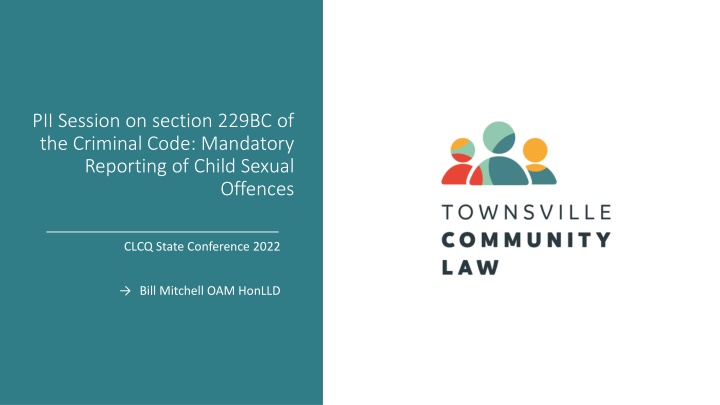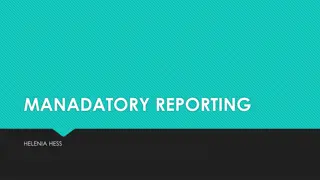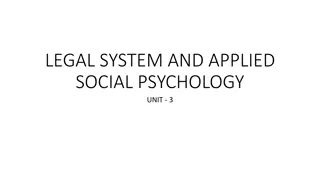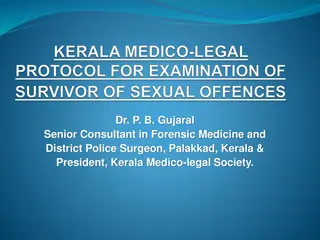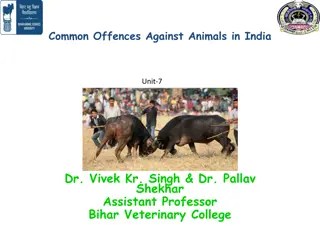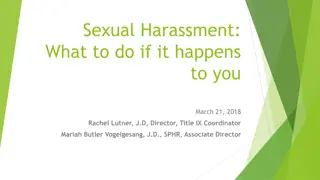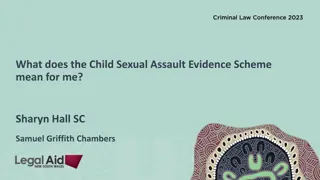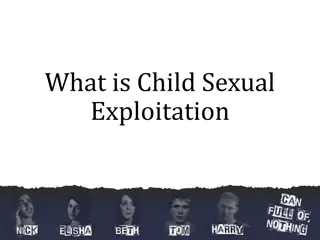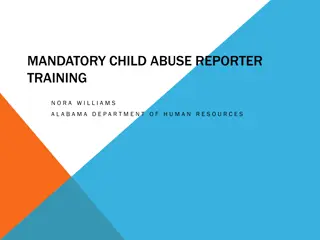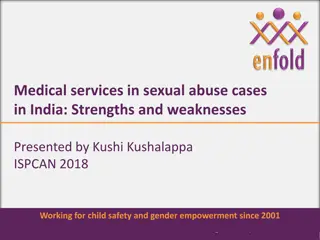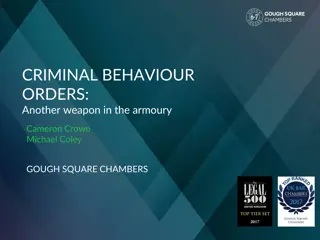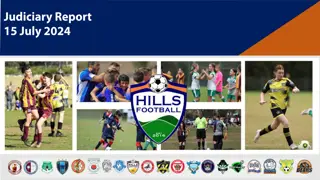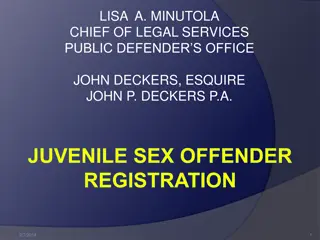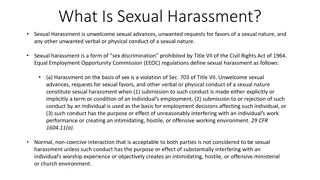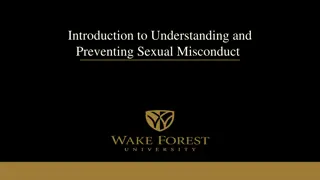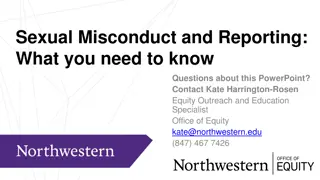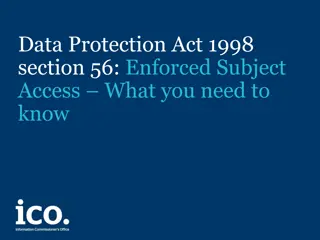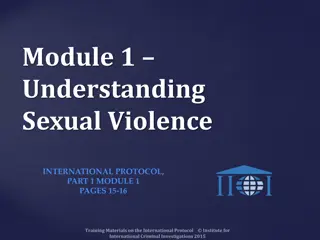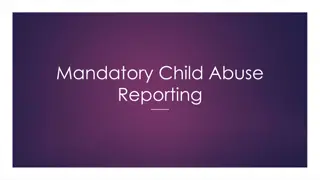Mandatory Reporting of Child Sexual Offences: Understanding Section 229BC of the Criminal Code
This session delves into the mandatory reporting requirements under section 229BC of the Criminal Code, focusing on the application, operational aspects, and key controversies. The amendments following the Royal Commission into Institutional Responses to Child Sexual Abuse are discussed, emphasizing the duty to report and potential consequences for failure to do so. The overview of section 229BC(1)-(2) highlights the obligations and implications for adults who fail to disclose information on child sexual offences to the police promptly.
Download Presentation

Please find below an Image/Link to download the presentation.
The content on the website is provided AS IS for your information and personal use only. It may not be sold, licensed, or shared on other websites without obtaining consent from the author.If you encounter any issues during the download, it is possible that the publisher has removed the file from their server.
You are allowed to download the files provided on this website for personal or commercial use, subject to the condition that they are used lawfully. All files are the property of their respective owners.
The content on the website is provided AS IS for your information and personal use only. It may not be sold, licensed, or shared on other websites without obtaining consent from the author.
E N D
Presentation Transcript
PII Session on section 229BC of the Criminal Code: Mandatory Reporting of Child Sexual Offences CLCQ State Conference 2022 Bill Mitchell OAM HonLLD
Acknowledgement of Country We acknowledge the traditional custodians of the land on which we meet today and pay respects to elders past, present and emerging for they hold the memories, the tradition, the culture and hopes of Aboriginal and Torres Strait Islander people across the nation. We extend our respect to the Aboriginal and Torres Strait Islander people who are present today.
Scope of the session Application of section 229BC Criminal Code Operational aspects Application to the community legal centres Key controversies and practical steps Caution it is a technical and developing area! Despite this, I am going to move through heavy content quickly Law is current to 1 May 2022
Why are we talking about it? Amendments follow the Royal Commission into Institutional Reponses to Child Sexual Abuse Part of a new legislative scheme including failure to protect and failure to report Considering the duty might be a regular occurrence for CLCs and staff Onus to report lies on us to report or not as appropriate Some complexity around interaction with various forms of privilege Potential to impact on our interactions with clients Serious consequences: Maximum penalty 3 years imprisonment Possible personal, occupational, professional and organisational consequences
Overview of sec 229BC(1)-(2) The adult gains information that causes the adult to believe on reasonable grounds, or ought reasonably to cause the adult to believe, that a child sexual offence is being or has been committed against a child by another adult; and at the relevant time, the child is or was under 16 years; or a person with an impairment of the mind If, without reasonable excuse, the adult fails to disclose the information to a police officer as soon as reasonably practicable after the belief is, or ought reasonably to have been, formed, the adult commits a misdemeanour.
Explanatory notes New section 229BC creates a new criminal offence which is a misdemeanour punishable by three years imprisonment that applies to an adult (i.e. a person 18 years or over) where the following circumstances are met: the adult gains information that causes them to believe on reasonable grounds, or ought reasonably to cause them to believe, that a child sex offence is being or has been committed by another adult (the alleged offender); at the time at which the offence is believed or ought reasonably to be believed to have been committed against the child, the child is under 16 years or is 16 or 17 years of age with an impairment of the mind; in the absence of a reasonable excuse, the adult fails to disclose the information to a police officer as soon as reasonably practicable after the belief is, or ought reasonably to have been, formed.
Reversal of Onus The effect of the reasonable excuse provision is to reverse the onus of proof to the defendant. The offence anticipates that information that would ground a reasonable belief that a sexual offence has occurred and triggers the obligation to report, will often be gained in clandestine circumstances. The reasonable excuse provision is included to ensure liability for the failure to report offence would not be unjustly imposed given the complexity and unpredictability of the situations likely to arise. Key Points: The central purpose of the provision is to impose a positive duty
Application: sec 751 751 Application of s 229BC Section 229BC applies to an adult in relation to information gained on or after the commencement whether the information relates to an alleged offence believed to have been committed by an alleged offender before or after the commencement. Key Points: It applies to information gained on or after 5 July 2021 Applies to alleged offences before or after commencement
A reasonable belief A reasonable belief is a belief that a reasonable person would form in the same position and with the same information. Whether a reasonable belief would be formed will always depend on the circumstances. For example, a reasonable belief could be formed if either: a child states that they have been sexually abused the child has signs of sexual abuse. https://www.qld.gov.au/law/crime-and-police/types-of-crime/sexual- offences-against-children/failure-to-report Key Points: Not an exhaustive list, rather a descriptive policy example See Phillip Swain. 1998. What is 'belief on reasonable grounds'? Mandatory reporting of child abuse in Victoria 23(5) Alternative Law Journal 230
Who does the duty involve? The information The person who gives the information (victim, perpetrator, third-party) The adult that gains the information The allegation The child: who is a victim of a historical or current child sexual offence Under 16 or 16-17 with an impairment of the mind Another adult(s) a perpetrator of a child sexual offence Reporting The police
Impairment of the mind person with an impairment of the mind means a person with a disability that is attributable to an intellectual, psychiatric, cognitive or neurological impairment or a combination of these; and results in a substantial reduction of the person s capacity for communication, social interaction or learning; and the person needing support. Key Points: How would we know this was the case? What about reports made by substitute decision-makers?
Relevant point in time "relevant time" , in relation to the child sexual offence mentioned in subsection (1) (a) , means the time that the adult believes to be the time of commission of the offence; or ought reasonably to believe to be the time of commission of the offence. Key Point: Necessarily involves detail about allegations Is there a positive duty to get those details?
What is a child sexual offence "child sexual offence" means an offence of a sexual nature committed in relation to a child, including, for example, an offence against a provision of this chapter or chapter 32 . Key Points: Includes a very wide range of offences Includes Chapter 32: Rape and sexual assaults Includes Chapter 22: Offences against morality (29 offences) But not exhaustive
Retrospectivity: sec 229BC (1) The failure to report offence has a partial retrospective application. The partial retrospective application of the offence is justified when balanced against the need for community protection. Child sex offenders victimise one of the most vulnerable groups in the community. Given children are generally unequipped to protect themselves from such predation, it is incumbent on the community to take steps to provide adequate protection from harm to these children by ensuring that offenders are identified and brought to justice.
What must be done: sec 229BC(2) If, without reasonable excuse, the adult fails to disclose the information to a police officer as soon as reasonably practicable after the belief is, or ought reasonably to have been, formed, the adult commits a misdemeanour. Maximum penalty 3 years imprisonment. Key Points: Positive duty to disclose to police Soon as reasonably practicable After considering the factors and any relevant reasonable excuses
Reasonable excuses: sec 229BC(4) Without limiting what may be a reasonable excuse: the adult believes on reasonable grounds that the information has already been disclosed to a police officer the adult has already reported the information under any of the following provisions, or believes on reasonable grounds that another person has done or will do so the Child Protection Act 1999, the Education (General Provisions) Act 2006, the Youth Justice Act 1992
Reasonable excuses: sec 229BC(4) Without limiting what may be a reasonable excuse: the adult gains the information after the child becomes an adult (the alleged victim), and the adult reasonably believes the alleged victim does not want the information to be disclosed to a police officer or both of the following apply the adult reasonably believes disclosing the information to a police officer would endanger the safety of the adult or another person, other than the alleged offender, regardless of whether the belief arises because of the fact of the disclosure or the information disclosed; and failure to disclose the information to a police officer is a reasonable response in the circumstances.
Some issues The reasonable excuse provisions do not mention privilege or other ethical issues The four categories of reasonable excuse do not address the situation where the person giving the information is a child other than the last sub- section where another person might be a child victim Given this, disclosures by children (or with impairment aged 16-17) will need to be very carefully considered, particularly given the nature of informed consent
Some more issues The laws do not prescribe the other kinds of abuse (some types of physical abuse, emotional abuse, neglect, and exposure to domestic violence) See for example Mathews et al. 2020. "Comparing Reports of Child Sexual and Physical Abuse Using Child Welfare Agency Data in Two Jurisdictions with Different Mandatory Reporting Laws" Social Sciences 9, no. 5: 75. https://doi.org/10.3390/socsci9050075
Protections for reporters Sub-section 229(5) An adult who, in good faith, discloses information mentioned in subsection (1)(a) to a police officer is not liable civilly, criminally or under an administrative process for making the disclosure. Key Point: Not clear how it interacts with disciplinary matters
Application: legal privilege While there is no statutory evidential privilege applying in Queensland, an express provision is included in the Bill to clarify the new third party offences apply to any information or knowledge gained during, or in connection with, a religious confession. The offences do not override any other privilege, including the privilege against self incrimination or legal professional privilege. Criminal Code (Child Sexual Offences Reform) and Other Legislation Amendment Bill 2019 Explanatory Note, page 6
Stepping through the issues Our position depends on two* possible situations: 1. The person giving the information is a client 2. The person giving the information is not a client The person* giving the information could be: the child victim (historic or current or both): a possible complainant the perpetrator (historic or current or both): a possible defendant A third-party disclosure (neither victim or perpetrator): a possible witness * Other situations may arise
Situation 1: A client A client-solicitor relationship is determined according to ordinary principles of contract law. (Notes 1 and 2) A signed costs agreement is evidence that an individual is a client. Absent a written client agreement, a retainer may be implied by conduct if all essential elements of a binding contract are satisfied. (Note 3) A person who instructs the law practice under a Power of Attorney on behalf of another, may also be a client of the practice. (Note 4) 1. Maxwell v Chittick & Ors (Unreported, NSWCA, 23 August 1994) 2. Apple v Wily [2002] NSWSC 855. 3. As to implication: Day v Mead [1987] 2 NZLR 443 per Somers J, cited in Apple v Wily, Wong v Kelly, Comptroller General of Customs (1999) 154 FLR 200, Beach Petroleum NL v Kennedy & Ors [1999] NSWCA 408 at para 208; As to elements: Integrated Computer Services Pty Limited v Digital Equipment Corporation (Australia) Pty Limited (Unreported, NSWCA, 23 December 1988, per McHugh JA) 4. See the comments of Murray J in Tobin v Dodd & Ors, at para [38] to [41].
Is a client Overview of obligations If the person giving us the information is a client, the question becomes: Is it privileged? If so, no report is required Is it confidential? If so, it may be a reasonable excuse and no report is required, but check ASCR Rule 9.2 which may allow disclosure Is there another reasonable excuse? If so, no report is required Has sec 229BC already been complied with? If so, no report is required Can sec 229BC be complied with? Seek guidance
Client legal privilege Kenny J in Commissioner of Taxation v Pratt Holdings Pty Ltd and Another: The common law in Australia is that legal professional privilege attaches to: 1. confidential communications passing between a client and the client s legal advice for the dominant purpose of obtaining or giving legal advice (legal advice privilege); and 2. confidential communications passing between a client and, the client s legal advisor and third parties, for the dominant purpose of use in or in relation to litigation, which is either pending or in contemplation (litigation privilege).
Limits of privilege The privilege does not extend to advice sought or given in the furtherance of, or to facilitate, criminal, fraudulent or other unlawful purposes. - R v Cox and Railton (1884) 14 QBD 153; R v Bell (1980) 146 CLR 141 at 145 per Gibbs J, at 152-3 per Stephen J, at 161-2 per Wilson J; Baker v Campbell (1983) 153 CLR 52 at 86-7 per Murphy J. Communications falling outside the privilege are not limited to those in pursuit of a crime or fraud, but extend to communications in pursuit of an illegal or improper object. Whether or not the lawyer was a party to, or ignorant of, those purposes is immaterial; the client s purpose is the relevant inquiry. - Southern Equities Corporation Ltd (in Liq) v Arthur Andersen and Co (1997) 70 SASR 166 at 174 per Doyle C J.
Confidentiality The Explanatory Note is silent on the issue of confidential information. There is some overlap, and the concepts have similar components, but privilege and confidentiality are different. Privilege is much more limited than the broad ethical duty of client confidentiality. For example, discussions between a lawyer and client could occur where the discussion is one held in confidence but it may not be privileged. The essence of the ethical rule is that we must never disclose to any person, any information which is confidential to a client and acquired by us during the client s retainer, unless the client authorises the disclosure, or we are permitted or compelled by law to disclose, or we are otherwise permitted by Rule 9.2 of the ASCR.
Australian Solicitors Conduct Rules 9. Confidentiality 9.1 A solicitor must not disclose any information which is confidential to a client and acquired by the solicitor during the client s engagement to any person who is not: 9.1.1. a solicitor who is a partner, principal, director, or employee of the solicitor s law practice; or 9.1.2. a barrister or an employee of, or person otherwise engaged by, the solicitor s law practice or by an associated entity for the purposes of delivering or administering legal services in relation to the client. EXCEPT as permitted in Rule 9.2.
Australian Solicitors Conduct Rules 9. Confidentiality 9.2. A solicitor may disclose confidential client information if: 9.2.1. the client expressly or impliedly authorises disclosure; 9.2.2. the solicitor is permitted or is compelled by law to disclose; 9.2.3. the solicitor discloses the information in a confidential setting, for the sole purpose of obtaining advice in connection with the solicitor s legal or ethical obligations; 9.2.4. the solicitor discloses the information for the sole purpose of avoiding the probable commission of a serious criminal offence; 9.2.5. the solicitor discloses the information for the purpose of preventing imminent serious physical harm to the client or to another person; or 9.2.6. the information is of the solicitor, law practice or associated entity. disclosed to the insurer
Disclosures: ASCR rule 9.2 Section 229BC and the exceptions in 9.2.4 and 9.2.5 partly reflect the line of authorities from Tarasoff v. Regents of the University of California, 17 Cal. 3d 425, 551 P.2d 334; see also M v Hutt Valley Health Corporation Limited HC Wellington [2001] NZHC 1166 In many cases that fit rule 9.2, disclosure may happen after ethical guidance (see rule 9.2.3) but the in cases of avoiding the probable commission of a serious criminal offence or preventing imminent serious physical harm to the client or to another person, one must obviously act very quickly
Disclosures: ASCR rule 9.2 Rules 9.2.1. would allow consent-based reporting in a forewarning situation Rule 9.2.2. may apply if no privilege, confidentiality or other reasonable excuse but forewarning may be appropriate Rule 9.2.4. echoes the obligation in sec 229BC in the case of prospective offending (akin to Misprision of felony now abolished) Rule 9.2.5. may apply if the requirements are met (the sexual offence is happening or is prospective)
Situation 2: Not a client The occasion of providing mere suggestions and not legal advice See Simmons v Story [2001] VSCA 187 c.f. Pegrum v Fatharly (1996) 14 WAR 92 A non-client, for example where we refer after taking details because of a potential conflict of interest but a duty of confidentiality remains, see for example ABA Rule 1.18 duties to a prospective client* What if the client lacks capacity to instruct or is under a legal disability e.g. sec 5(2) Limitation of Actions Act 1974. * See discussion at https://www.mnbar.org/resources/publications/bench- bar/columns/2020/07/01/prospective-clients-and-the-ethics-rules
Not a client Overview of obligations If the person giving us the information is not a client, the question becomes: Is it confidential? If so, it may be a reasonable excuse and no report is required, but consider the countervailing ethical duty in the application of rule 9.2 to non-clients (rules 9.2.4, 9.2.5) Is there a reasonable excuse? If not confidential, does another reasonable excuse apply? Has sec 229BC already been complied with? If so, no report is required Can sec 229BC be complied with? Seek guidance
Duty to non-client Generally speaking, solicitors do not owe a duty of care to persons who are not their clients: see, for example, Hill v van Erp (1997) 188 CLR 159 There are, however, circumstances in which a duty of care on the part of a solicitor may arise independently of a retainer. Thus, a duty of care has been said to arise in the context of negligent misstatement causing loss: see Hedley Byrne & Co Ltd v Heller & Partners Ltd [1964] AC 465 See for example the basis of ASCR rule 9.2.4 and 9.2.5. (Tarasoff v. Regents of the University of California, 17 Cal. 3d 425, 551 - the so-called duty to warn or protect)
Examples Scenario 1 You are at a barbecue with family members and friends. Your 14-year-old niece tells you that earlier in the afternoon an 18-year-old at the party took her into a bedroom and got her to pose for a nude photograph. What should you do? You must report this information to the police. The 18-year-old may have committed an offence of making child exploitation material or indecently treating the child. Failure to report it may be an offence.
Examples Scenario 2 Your adult partner confides in you they were sexually abused by a neighbour when they were 5. Your partner tells you they do not want to make a complaint to police. What should you do? As your partner is now an adult and you reasonably believe they do not want you to reveal the information to police, you do not have to report the child sexual offence to police you have a reasonable excuse.
How to report To report an offence, contact PoliceLink on 131 444. If it s an emergency, phone Triple Zero (000). If you are unsure of your reporting obligations at work, talk to your manager or the human resources contacts at your organisation. You may wish to get legal advice if you are unsure about reporting. https://www.qld.gov.au/law/crime-and-police/types-of-crime/sexual- offences-against-children/failure-to-report
The forewarning approach The approach of service providers can include a "forewarning approach" where a person is made aware of the reporting duty and can make an informed decision about whether to provide information Needs to be understood by all who might find themselves in receipt of information whether client or non-client (possibly better described as service users) Key Points: The use of scripts can assist to ensure consistent approach by staff Volunteers are a source of necessary risk management Impaired capacity may be an issue at times
AASW code of ethics 2020 5.4.3 Social workers will inform service users before commencing interviews if the information obtained will be used for assessment or any other purpose and will be provided to third parties for legal or other reasons. 5.4.5 Social workers will only reveal confidential information in the circumstances outlined above or in any one or more of the following situations, provided it is permitted by law: if by revealing information to relevant third parties an actual, identifiable risk of harm to a specific person or persons can be prevented where disclosure is required by law (e.g. court subpoena or statutory requirement).
Queries about the duty If you have any questions about the practical operation of the offences, you can email childsexualoffencesreform@justice.qld.gov.au. Do not use this email for either: legal advice about your specific situation and hypothetical scenarios seek independent legal advice instead reporting offences under these laws they must be reported to the Queensland Police Service. https://www.qld.gov.au/law/crime-and-police/types-of-crime/sexual- offences-against-children/failure-to-report
Human rights The application of the Human Rights Act 2019 is also untested in this regime, especially: s15 Recognition and equality before the law s16 Right to life s17 Protection from torture and cruel, inhuman or degrading treatment s21 Freedom of expression 25 Privacy and reputation 26 Protection of families and children All involved may have competing rights interests
Recapping some RRRs Retrospective application Reversed onus Requires careful consideration Reasonableness: Reasonable belief Reasonable grounds Reasonable excuse Reasonably practicable Reasonable response Rights engaged: Autonomy, Rules engaged: ethical and conduct rules Read the Code and Related information Reach out for guidance
Thank you Questions or Feedback
